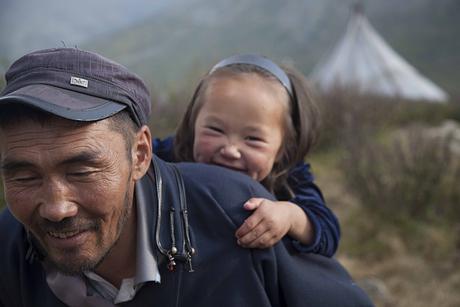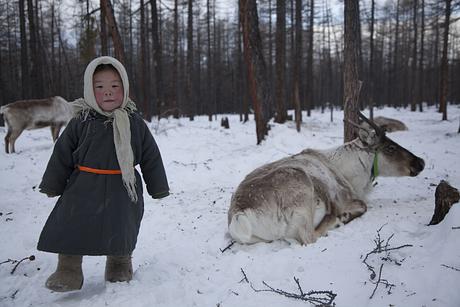Mongolian reindeer herders banned from hunting in the name of 'conservation'
December 22, 2015
 © Selcen Kucukustel/Magma magazine
© Selcen Kucukustel/Magma magazineThis page was last updated in 2015 and may contain language which is now outdated.
The nomadic reindeer-herding Dukha tribe of northern Mongolia are struggling to feed their families after being banned from hunting in the name of “conservation.” Their land was declared a protected area in 2013 and if caught hunting they must pay fines they cannot afford, or face a long prison sentence. They are also facing restrictions on where they migrate to, and now need permission to go to distant camps.
The Dukha, who number around 500, are also known as Tsaatan. Many have been settled, but about 200 are nomadic hunter gatherers. They migrate with their reindeer and live on the taiga in canvas tents which they call alaci. The Dukha use their reindeer for transport and milk, only slaughtering their animals if they are old, or in times of desperation. For their food they rely on hunting wild animals such as deer, boar and elk, and collecting wild potatoes and berries.
The Dukha have hunted sustainably for generations, with their own strict rules governing the number of animals they can kill, and when and where they can hunt. These rules ensure that they don’t over-hunt, only taking what they need. Hunting is not just a way of getting food, it’s integral to their way of life.
 © Selcen Kucukustel/Magma magazine
© Selcen Kucukustel/Magma magazine
The Dukha perform shamanic rituals to show their thanks and ask for forgiveness from the spirit of the animal after a successful hunt. An elderly Dukha hunter explains: "We say: ‘Thank you very much Mother Earth, for giving animals from your wealth. I hope all these animals return back to you even more than now.’ We also offer some of this meat to the fire, nature and the spirits before we eat it.”
The Dukha are struggling to understand why outsiders are imposing these restrictions on them in the name of conservation, when they are already so careful about how they hunt and protect their land. Evidence from around the world shows that tribal peoples are better at looking after their environment than anyone else. They are the best conservationists and guardians of the natural world.
A Dukha elder said, “This is our home. We have been living here for generations. We make sure that we look after and care for our home. How can outsiders come and tell us to protect it with fines and lists while we have already been doing it for centuries?”


